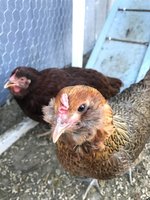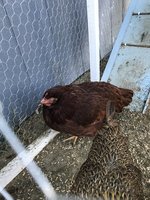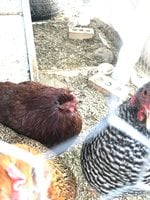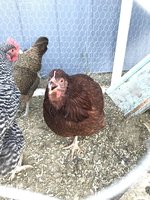AccidentalChickenLady
In the Brooder
- Sep 19, 2017
- 37
- 19
- 49
My Rhode Island Red, Ginger, is almost six months old, and for the past few days has been very low-energy. We went away for the weekend (had a family member tend to the birds), and when I came back, I noticed that she looks a little off... She's closing her eyes a lot, looks a bit pale, her feathers are extra puffed out, and when she stands still, she looks like she is gasping (or trying to squawk, but no sound comes out). I also noticed her sneezing a few times during the 10 minutes I spent with the birds this evening. She did not put herself to bed in her coop tonight; I picked her up and put her inside with he really sisters. I'm also attaching a few photos that I took today.
She is still eating (regular MannaPro egg-maker pellets and treats), though she is at the bottom of the pecking order, so she only gets whatever is left of treats. She did come up to the gate this afternoon with her sisters when I brought treats. She has not started laying yet, though her other two flock-mates (a BR and EE from the same local Colorado farmer and hatched within days of Ginger) are both laying regularly. She is drinking (we have a bucket with nipples hanging in the middle of the run), and I have not noticed the other two girls picking on her. She did have a limp about a month ago, but she is walking evenly on both legs now. I just cleaned off the poop boards and don't see any bloody stool.
My primary concern is potential disease, given the fact that I lost another bird (an EE, mentioned here: https://www.backyardchickens.com/th...ic-after-beak-trimming.1199453/#post-18987926 ) without much explanation just a few weeks ago. Is there some kind of immune-boost I can give Ginger that might help her kick whatever's got her down? I'd just hate to lose another one of my little friends. Any advice (especially at-home/low-cost remedies) are greatly appreciated.
She is still eating (regular MannaPro egg-maker pellets and treats), though she is at the bottom of the pecking order, so she only gets whatever is left of treats. She did come up to the gate this afternoon with her sisters when I brought treats. She has not started laying yet, though her other two flock-mates (a BR and EE from the same local Colorado farmer and hatched within days of Ginger) are both laying regularly. She is drinking (we have a bucket with nipples hanging in the middle of the run), and I have not noticed the other two girls picking on her. She did have a limp about a month ago, but she is walking evenly on both legs now. I just cleaned off the poop boards and don't see any bloody stool.
My primary concern is potential disease, given the fact that I lost another bird (an EE, mentioned here: https://www.backyardchickens.com/th...ic-after-beak-trimming.1199453/#post-18987926 ) without much explanation just a few weeks ago. Is there some kind of immune-boost I can give Ginger that might help her kick whatever's got her down? I'd just hate to lose another one of my little friends. Any advice (especially at-home/low-cost remedies) are greatly appreciated.








